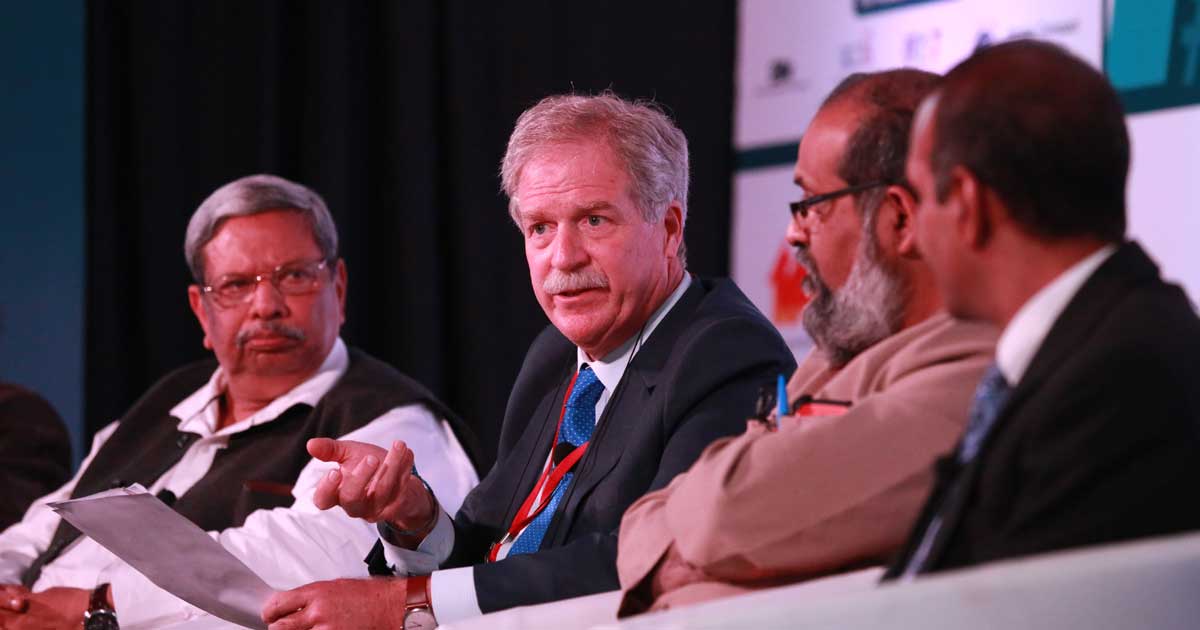
A Resilient Planet Needs Water Cooperation
Water cooperation would be one of the founding pillars of a resilient planet. Experts at the World Sustainable Development Summit 2018 agreed that the benefits of water cooperation are very high and global sustainability would be greater if the power of water cooperation is harnessed.
 Conversations Resolve Conflict: Experts at WSDS say robust frameworks, conversations will help in resolving water disputes
Conversations Resolve Conflict: Experts at WSDS say robust frameworks, conversations will help in resolving water disputes
The session included Dr M Ariz Ahammed, Mission Director, National Water Mission; Dr David Molden, Director General, International Centre for Integrated Mountain Development, Dr O P Agarwal, CEO, World Resources Institute India; Dr Syamal Kumar Sarkar, Distinguished Fellow & Senior Director, Water Resources Division, TERI; and Dr Ravi Srivastava, First Secretary for Environment, Science and Technology Economic, Environment, Science & Technology Affairs, US Embassy.
Dr David Molden said water cooperation can reduce the impact of disasters, such as floods and droughts. He added that the cost of non-cooperation could be too high in terms of environmental degradation, increased damages from disasters, water conflicts amongst others. He, however, added that there were bright spots in terms of community-level water sharing that could be used as an example to learn from.
Dr M Ariz Ahammed, Mission Director, National Water Mission, presented the Indian scenario in water availability and consumption. He said the per capita availability of water has seen a steep decline over the years. Water being a state subject, state governments play a major role in water governance, which is distributed. Emphasizing that proper water budgeting was needed while managing both demand and supply side, he said a single agency must be identified for water governance and state water budgets should be institutionalized.
Dr O P Agarwal, CEO, World Resources Institute (WRI), India, highlighted the need for inter-sector water cooperation. He said the annual water consumption by the energy sector is projected to grow from 0.6% to 9% in 2050 to 130 million cubic metres. He added that 40% of the fresh water-cooled thermal capacity in India is in high water-stressed areas. Adding that urbanization will further increase inter-sectoral competition in water consumption, he said the demand for water from agriculture will also rise correspondingly.
Dr Agarwal suggested a few solutions to tackle the situation. These included accelerating renewable energy in national electricity mix, implementation of the existing efficient cooling technology regulations for power plants that the Ministry of Environment, Forest and Climate Change specified in 2015 and collection and monitoring of water-related data for power plants. He further said that assessment of demand-side requirements, efficient designing of projects, and separate water impact assessment studies for industries were needed.
Dr Ravi Srivastava, First Secretary for Environment, Science and Technology Economic, Environment, Science & Technology Affairs, US Embassy, stressed upon the need for conversations to resolve water conflicts. He said there was a need for frameworks and mechanism where people who are contesting can come together and discuss issues which would eventually lead to resolution. He said that solutions exist, but people have to recognize the opposite party's legitimate interest and be open to conversations for conflict resolution.
Dr Syamal Kumar Sarkar, Distinguished Fellow & Senior Director, Water Resources Policy and Management, TERI, said while water is a highly politicized subject, water is a national asset and has to be conserved and treated accordingly. Water resources of river basins, he said, are not owned by any state. However, as a trustee of this resource, states have the right to use, which cannot be considered as equal right but equitable right. He said the legal framework for water sharing is still evolving in India.